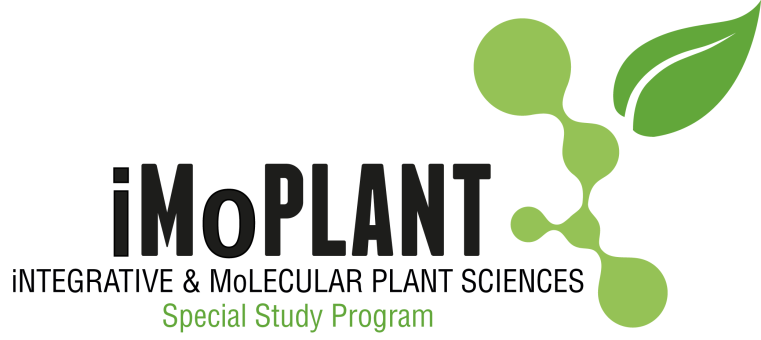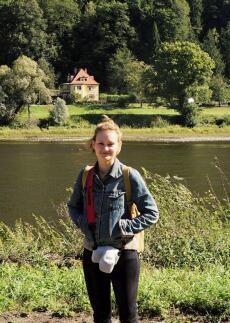

What is iMoPLANT?
iMoPLANT (iNTEGRATIVE & MoLECULAR PLANT SCIENCES) is a Special Study Program (SSP) within the MSc Biosciences program.
It equips students with a critical and practical mindset to think about how plants function and what tools plant science can provide to solve the planet's urgent problems.
The iMoPLANT program offers a diverse selection of modules (marked with the iMoPLANT label) that students can choose from to receive training in state-of-the-art methods in Plant Biology, including Cell- and Molecular Biology, Biochemistry, Biotechnology, Evolution, Genomics, Lipidomics, Metabolomics, Proteomics and Plant Physiology.
iMoPLANT is aimed at highly motivated students seeking for an outstanding curriculum with the focus on Molecular Plant Sciences.
An overview of the iMoPLANT structure and content, as well as information on how to apply is provided in the Flyer.
Why is it important to study Plant Biology?
Plants are fundamental for all aspects of life on earth. They provide us with renewable resources, such as oxygen, food, energy, and medicinal compounds. At the same time, plants are essential cornerstones of our ecosystems.
Nowadays, we are experiencing new challenges, such as climate change, increasingly limited arable land, disturbed ecosystems, and novel diseases that challenge crop production.
Today, Plant Sciences are more important than ever and will continue to be so in the future.
Hence, Plant Biologists are urgently needed to implement and improve a more sustainable environment with a bioeconomy that protects species and ecosystems, ensures the global food supply, and mitigates the effects of climate change based on a more eco-friendly and sustainable agriculture.
Which Institutes and Research Groups participate in the iMoPLANT program?
At the Faculty of Biology, the Institute of Plant Biology and Biotechnology (IBBP) and the
Institute for Evolution and Biodiversity (IEB) participate in the iMoPLANT program.Within these Institutes, groups with a focus on “Plants” contribute to the iMoPLANT program. These are the Research Groups:
- Plant Physiology & Proteomics: Prof. Dr. Iris Finkemeier
- Plant Signaling: Prof. Dr. Ora Hazak
- Plant Biochemistry & Biotechnology: Prof. Dr. Michael Hippler
- Plant Lipid Droplets: Prof. Dr. Till Ischebeck
- Molecular Genetics & Cell Biology of Plants: Prof. Dr. Jörg Kudla
- Biopolymers & Molecular Phytopathology: Prof. Dr. Bruno Moerschbacher
- Evolution & Biodiversity of Plants: Prof. Dr. Kai Müller
- Molecular Phloem Dynamics: APL. Prof. Dr. Gundula Noll
- Plant Biotechnology: Prof. Dr. Dirk Prüfer
- Molecular Physiology of Plants: Prof. Dr. Antje von Schaewen
- Plant Energy Biology: Prof. Dr. Markus Schwarzländer
- Biotic Plant Interactions: Prof. Dr. Susann Wicke
And the Junior Research Groups:
- Establishment of Yam As a Potential Crop in Europe: Dr. Janina Epping
- Plant Abiotic Stress Signaling & Response: Dr. Rainer Waadt
All advanced modules and research modules offered by the iMoPLANT groups are registered within the “Modulhandbuch” and marked with the “green” label.
What is the "Plants of the Future" Lecture Series?
The “Plants of the Future” Lecture Series is addressed to all MSc Biosciences/Biotechnology students with a strong interest in Plant Science. It takes place in each winter semester (scheduled weekly on Wed. 9-10 AM) and includes one lecture from each research group leader that participates in the iMoPLANT program plus one external speaker from Industry. This Lecture Series is a great opportunity for students to learn about the current Plant Research that is conducted by the iMoPLANT groups and helps to choose potential Modules or Master Theses projects.
To register for the “Plants of the Future” Lecture Series, please contact the iMoPLANT coordinator Dr. Rainer Waadt.
The “Plants of the Future” program for the WiSe 2025/2026 can be found here:
Date
Time
Room
Speaker
Title of Lecture
Wed
2025-10-229:00-10:00
SP4 201
Iris Finkemeier
Quantitative and Functional Plant Proteomics: From Peptides to Phenotypes
Wed
2025-10-299:00-10:00
SP4 201
Markus Schwarzländer
The remarkable superpowers of plant mitochondria
Wed
2025-11-059:00-10:00
SP4 201
Rainer Waadt
Visualization Of Abscisic Acid Phytohormone Responses To Water Shortage
Wed
2025-11-129:00-10:00
SP4 201
Felix Buchert
Chloroplast ATP Synthase – Balancing the Light and Dark Phases of Photosynthesis
Wed
2025-11-199:00-10:00
SP4 201
Jan-Ole Niememeier
Development of fluorescent protein-based biosensors to dissect plant redox and energy metabolism
Wed
2025-11-269:00-10:00
SP4 201
Christian Schulze Gronover
Research for the development of dandelion as source for natural rubber
Wed
2025-12-039:00-10:00
SP4 201
Magnus Wolf
Evolutionary and Conservation Genomics in Plants
Mon
2025-12-088:15-9:45
IMMB Seminar room
Dirk Prüfer
Plant-Biotech I
Wed
2025-12-109:00-10:00
SP4 201
Till Ischebeck
The power of "omics" - What we can learn about plants using modern mass spectrometry
Wed
2025-12-179:00-10:00
SP4 201
Michael Hippler
Inside the Photosynthetic Pipeline: Mechanistic Insights into PSI–b6f Electron Transfer and STT7 Feedback
Winter Break
Wed
2026-01-079:00-10:00
SP4 201
Janina Epping
Beneath the Surface: The Biology of Underground Storage Organs
Wed
2026-01-149:00-10:00
SP4 201
Zaida Andres (Syngenta)
Developing Biological Solutions for Plant and Soil Health
Wed
2026-01-219:00-10:00
SP4 201
Jörg Kudla
Using genome editing for the de-novo domestication of crops: New Crops for a new agriculture?
Wed
2026-01-289:00-10:00
SP4 201
Ora Hazak
Cracking the Code of Plant Growth
Mon
2026-02-028:15-9:45
IMMB Seminar room
Bruno Moerschbacher
Plant Immunity
How to obtain the iMoPLANT Certificate?
iMoPLANT follows the structure of the MSc Biosciences program, which consist of the Project Management Module, the Integrative Biology Module, five four-week Advanced Modules (AdMs), two eight-week Research Modules (RMs) during the first year, plus the Master Thesis accompanied by supporting Satellite Modules during the second year.
For obtaining the iMoPLANT certificate it is required to:
- Complete 20 CPs through the participation in Advanced Modules and/or Research Modules that are tagged with the "green" label and/or that are organized by the iMoPLANT research groups.
- Participate in at least 50% of the lectures of the “Plants of the Future” Lecture Series.
- Conduct the Master Thesis (60 CPs) in (or associated with) one of the iMoPLANT research groups.

iMoPLANT Structure© RW After completion, students will receive an official iMoPLANT certificate besides the degree in MSc Biosciences, showing that they received state-of-the-art training in Molecular Plant Sciences.
Within the the iMoPLANT program, SSP students will specialize in Integrative & Molecular Plant Sciences with the flexibility to choose additional modules that do not necessarily focus on plants. This provides the possibility to create a broad-minded, individual, and unique research profile.
For further information about iMoPLANT modules, please consult the “Modulhandbuch” or contact the Professor who offers the module directly.To receive the SSP iMoPLANT certificate, please contact Loreen Linnenbrügger, the secretary to the head of the IBBP.
How to apply to the SSP iMoPlant
If interested in the outlined program, please contact the SSP iMoPLANT coordinator Dr. Rainer Waadt.
If you need advice on choosing among iMoPLANT modules or how to plan your Masters curriculum, please contact Dr. Rainer Waadt or chose a mentor among members of the iMoPLANT research groups.
While it is not mandatory, it is recommended to choose a mentor among the iMoPLANT research groups, to discuss research interests and study plans for an optimal selection of modules. This does not need to be the head of the group where the Master Thesis will be eventually conducted.
What are the future benefits from participating in the SSP iMoPLANT?
The aim of the iMoPLANT program is to train talented students as plant scientists with a competitive and unique curriculum that provides them with the necessary tools to pursue their own career. There are several paths that students may follow, after participating in the SSP iMoPLANT:
- Scientific career: PhD studies to achieve a leading position in Industry or at a Research Institute (Max Planck Institute, Fraunhofer, etc.) or University.
- Industrial career: In a company working in the field of agro-biotechnology, phytopharming, horticulture, sustainable energy production (amongst others).
- Science management: working as research coordinator, scientific consultant, or in a research funding organisation (such as the DFG, BMBF, etc.)
- Scientific journalism: working as a science journalist or as an editor in a scientific journal, newspaper, etc..
- Career in a Non-Profit Organisation: e.g. World Health Organization (WHO), working in a seed bank or institution that conserves biodiversity worldwide.
- Career in a governmental or international institution (such as the EU).
What do former students think about the SSP iMoPLANT?
Christopher Bell (WiSe 2020/2021)
Research in plant science has fascinated me in many ways because plants are so diverse and yet so similar. From a tiny water lense to a gigantic sequoiadendron, plants grow everywhere. Even the most extreme places, such as deserts or salt marshes, are no obstacle to plant growth. The many molecular networks that regulate plant life, evolution and function still raise many unanswered questions, and I want to contribute to their investigation. As this knowledge is the basis for green biotechnology and crop optimisation research —which are becoming more important nowadays— I believe these are very interesting fields of research.
I started my master's studies in autumn 2020 and decided to participate in the iMoPLANT programme to get to know the different research fields of the IBBP and IEB. This programme is a unique opportunity to discover the broad spectrum of plant science and to gain an impression of a career as a plant scientist.
© Uni MS - Dr. Maida Romera Branchat Katharina Eickelpasch (WiSe 2019/2020)
For me, the most important aspect is the great potential that is hidden in plants: from new resistant, adapted plant species that can contribute to securing the future world's food supply, to the biotechnological use of plants to produce certain things in a sustainable and environmentally friendly way. I believe that research in this direction can achieve a lot and that is exactly what I am motivated by. There is still a lot to learn about plants that we still do not understand, and I hope that through my research I can help to exploit the full potential of plants and may contribute to a better world.
Next year I will start my master thesis in Prof. Dr. Moerschbacher's group working on different chitosans in terms of plant strengthening.
© Uni MS - Dr. Maida Romera Branchat Dennis Brandt (WiSe 2018/2019)
The molecular mechanisms, which regulate the physiology of plants, are not yet well understood, although plants play a crucial role in almost all ecosystems and in our daily lives. For me, conducting research to better understand these mechanisms is very intriguing. The experimental work done by us students could ultimately lay the foundation for future innovations in agriculture and applied biotechnology. This, together with the growing relevance of green biotechnology, definitely makes plant molecular science very interesting to me.
I am pursuing my master's thesis in Dr. Née’s group under the supervision of Dr. Née and Prof. Dr. Finkemeier, where I am studying the regulation of germination in Arabidopsis thaliana. Many environmental and genetic factors influence germination; deciphering the molecular machinery, which controls germination, may ultimately be the key to ensuring the food supply for future generations under changing climatic conditions.

© Uni MS - Dr. Maida Romera Branchat Lea-Franziska Reekers (WiSe 2017/2018)
I started researching plant sciences with the aim of contributing to knowledge that would help develop new sustainable and future-oriented forms of cultivation and food that are adapted to rapid changes in climate. Climate change is already endangering sufficient food supply in so many regions of the world so I believe that understanding the mechanisms underlying plant resistance to stress will be instrumental in solving this problem.
I am pursuing my master’s thesis in Prof. Dr. von Schaewen’s group on protein N-glycosylation in Arabidopsis thaliana under the supervision of Dr. Heidi Kaulfürst-Soboll and Prof. Dr. von Schaewen. N-glycosylation is an evolutionary conserved mechanism that co-and post-translationally attaches and modifies glycans on specific sites in proteins. The most complex N-glycan formed in plant cells is the Lewis-a epitope. I am studying the effect that losing the ability to form lewis-a epitopes has on Arabidopsis thaliana plants.
Studying in Münster
Welcome to Münster!
Münster is a very attractive city for university studies. Around 20% of the local population are students (~60,000).Münster is known as the “Bicycle capital of Germany”, famous for being lively and dynamic, offering a multitude of cultural and leisure activities.
University of Münster is among the five largest universities in Germany and offers students a wide range of facilities and support. Above all, the goal is to connect teaching with research, following the motto "living.knowledge".
In particular, the Faculty of Biology offers state-of-the-art research at each of its institutes, currently represented by six research focus areas.
Contact
Coordinator of the SSP:
Dr. Rainer WaadtDirector of the SSP:
Prof. Dr. Markus Schwarzländer & Prof Dr. Till IschebeckSecretary of the SSP (iMoPLANT Certificate):
Loreen Linnenbrügger
